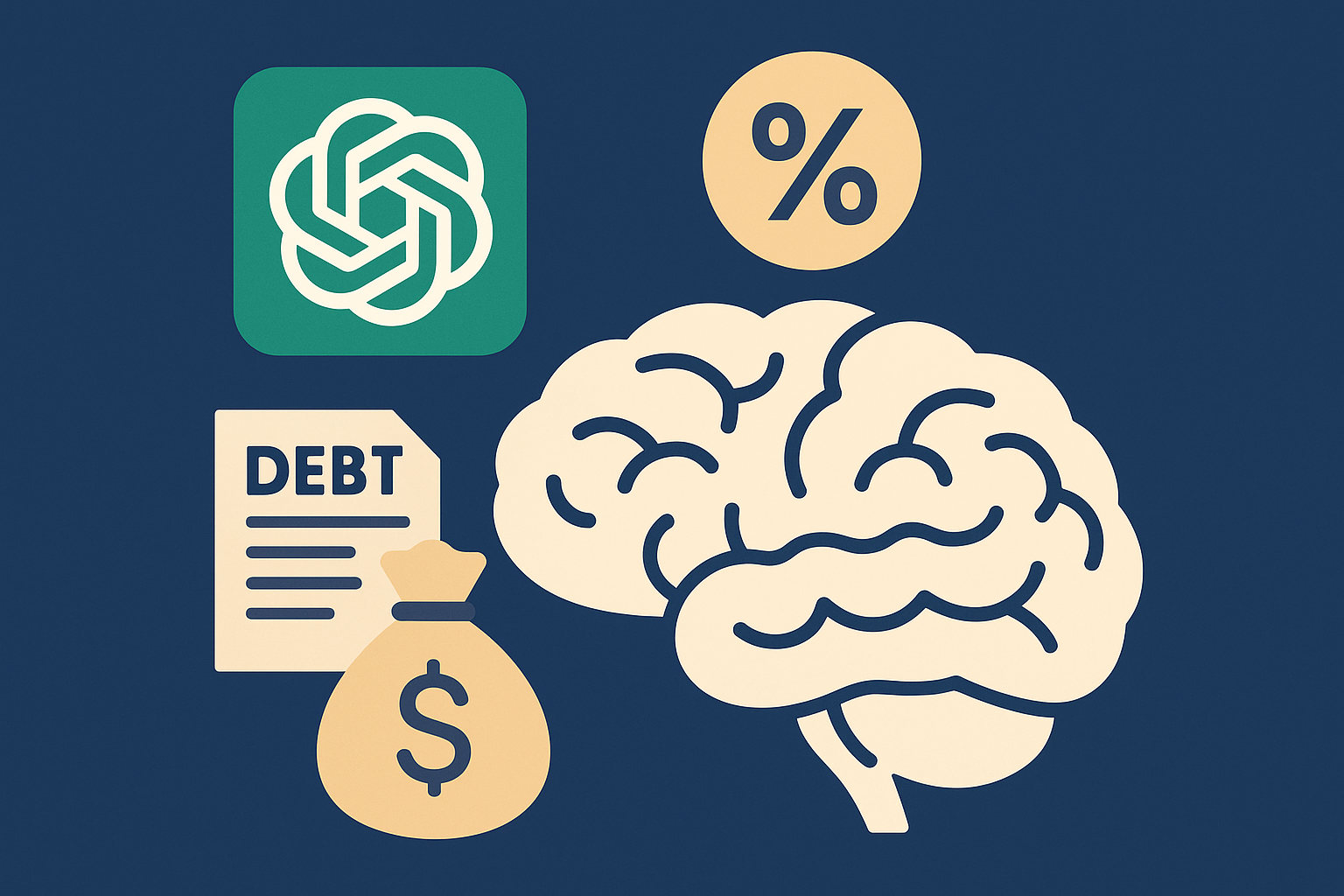Your Brain is Paying Interest on ChatGPT's Loan
June 22, 2025

Let me be brutally honest about something: every time you hit "generate" on ChatGPT for that essay, email, or report, you're not just saving time. You're taking out a loan against your own intelligence. And like most debt, the bill comes due eventually.
I know, I know. You're thinking, "Here we go again - another tech panic. Remember when people said calculators would ruin math skills?"
Not this time. This is different.
The MIT nerds just dropped some research that should scare the hell out of anyone who's been treating ChatGPT like their personal writing assistant. They hooked 54 people up to EEG machines and watched their brains in real-time while they wrote essays. Three groups: ChatGPT users, Google searchers, and people using nothing but their own gray matter.
The results? Holy shit.
The Cognitive Bankruptcy Report
Here's what happened when people relied on ChatGPT for writing:
Brain activity collapsed. Not "got a little quieter." Collapsed. The people writing with their own brains showed the strongest neural connectivity - their brains were lighting up like Christmas trees, different regions talking to each other, working hard. The ChatGPT group? Barely a flicker. Their neural networks went into energy-saving mode.
Memory went to hell. When asked to quote from essays they had just written, 83% of the ChatGPT users failed. Zero - and I mean ZERO - could provide a perfect quote. Compare that to the brain-only group where only 11% had this problem.
Think about that. They couldn't remember what they "wrote" because they didn't actually write it. They were glorified copy-paste operators.
Identity crisis hit hard. The brain-only writers felt the essays were theirs. The ChatGPT group? They didn't know who the hell wrote what. Some claimed ownership, others explicitly denied it. You can't own what you didn't create.
But here's the real kicker...
The Hangover That Doesn't Go Away
Session 4 was where this study went from concerning to terrifying. They switched the groups. ChatGPT users had to write without AI. Brain-only writers got to use ChatGPT.
The ChatGPT veterans didn't bounce back. Their brains stayed quiet. Even without the AI crutch, their neural connectivity remained weaker than people who'd been using their own brains all along. The researchers called this a "cognitive hangover."
Meanwhile, the brain-trained writers who finally got ChatGPT? Their brains woke up when using the tool. They engaged more deeply, asked better questions, used it as an actual collaborator rather than a replacement.
The lesson is obvious: Train your brain first. Use AI second.
This Isn't Your Smartphone
Before you dismiss this as just another "technology anxiety" moment, understand something critical: this is not the same as GPS making us worse at navigation or smartphones storing our phone numbers.
When you use GPS, you're outsourcing memory. When you use ChatGPT for writing, you're outsourcing thinking itself. The neural pathways for structuring arguments, choosing words, and synthesizing ideas - that's what's atrophying.
GPS helps you retrieve directions. ChatGPT generates thoughts. One is a tool for accessing information. The other is a replacement for cognition.
That's the difference between helpful and harmful automation.
The Real Cost of Cognitive Debt
Here's what nobody's talking about in all the ChatGPT hype: cognitive debt compounds.
Every time you let AI do the thinking, you're not just missing practice. You're actively weakening the neural networks that handle complex thought. The MIT study showed this isn't temporary - it's persistent. Those brain connections don't just snap back.
In business terms: you're borrowing against future intellectual capacity to pay for current convenience. And just like financial debt, the longer you wait to pay it back, the more expensive it gets.
The Competitive Advantage Nobody Sees Coming
While everyone's racing to adopt AI for everything, there's a massive opportunity hiding in plain sight: being the person who can still think without it.
The ChatGPT generation is producing homogenized, forgettable content. The MIT study proved it - essays became more similar, more generic, more predictable. When everyone's using the same AI, everyone sounds the same.
But the person who can structure complex arguments, synthesize original ideas, and remember what they wrote? That's becoming increasingly rare. And rare skills command premium prices.
How to Use AI Without Losing Your Mind
I'm not saying avoid AI. I'm saying use it strategically:
Start with your brain. Work through the problem yourself first. Outline your argument, identify your key points, struggle with the logic. Then use AI to help refine, fact-check, or overcome writer's block.
Never let it do the core thinking. Use ChatGPT for research, brainstorming, or editing. Don't use it to replace the fundamental cognitive work of creating and organizing ideas.
Practice cognitive strength training. Regularly write, analyze, and create without any AI assistance. Treat it like going to the gym - you need to maintain those neural pathways.
Question everything it produces. The MIT study showed AI users often accepted suggestions "without evaluating their accuracy or relevance." Don't be that person.
The Choice is Yours
The research is clear: you can either become ChatGPT's unpaid intern, mindlessly formatting its output, or you can use it as a powerful tool that amplifies your already-strong thinking.
The first path leads to cognitive dependency and intellectual mediocrity. The second path leads to superhuman productivity built on a foundation of genuine intelligence.
Your brain is still the most sophisticated thinking machine ever created. Don't trade it for convenience.
The choice you make today determines whether you're building cognitive wealth or accumulating cognitive debt. And unlike financial debt, you can't declare intellectual bankruptcy and start over.
Choose wisely. Your future self - and your competitive advantage - depends on it.
What's your take? Are you building cognitive debt or cognitive wealth with your AI usage?